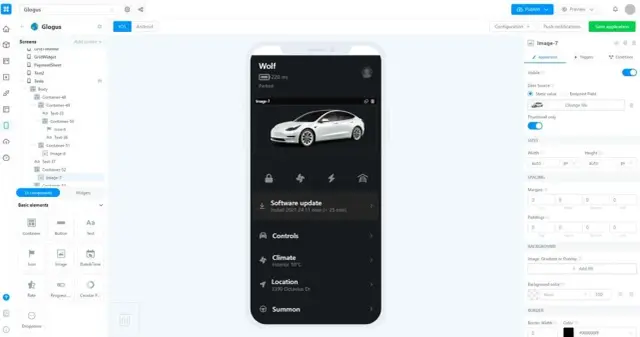Role of AI in Mobile App Development
Discover the transformative role of artificial intelligence (AI) in mobile app development, and learn about new possibilities, potential challenges, and emerging innovative trends in the industry.

Introduction to AI and Mobile App Development
The proliferation of mobile devices and the rapid growth of app stores have led to an increasing demand for sophisticated mobile applications offering enhanced user experiences and functionalities. As a result, mobile app developers are constantly exploring innovative ways to leverage advances in technology to improve the design and development process of mobile apps.
One of the major technological breakthroughs in recent years is Artificial Intelligence (AI), which has begun to play a transformative role in mobile app development. AI, a branch of computer science that focuses on enabling machines to mimic human intelligence, has significantly impacted multiple industries, including healthcare, finance, retail, and transportation.
In the context of mobile app development, AI technologies and machine learning algorithms have the potential to automate development processes, understand user preferences, add intelligence to apps, and deliver personalized experiences. This article explores how AI is transforming mobile app development, along with some innovative AI-driven trends in mobile application design and development.
The Ways AI is Transforming Mobile App Development
AI technologies are steadily finding their way into the mobile app development, revolutionizing the way developers approach app design, development, testing, and maintenance. Some of the ways in which AI is transforming mobile app development are as follows:
- Personalization and Improved User Experiences: AI can analyze user behavior, preferences, and usage patterns to deliver personalized app experiences. By understanding user needs and dynamically adapting content, mobile apps incorporating AI provide tailored experiences that boost user engagement and satisfaction.
- Process Automation and Enhanced Productivity: AI-driven automation can streamline various development and testing processes. By automating repetitive tasks, developers can focus on more critical aspects of app building, resulting in increased productivity, reduced development time, and cost savings.
- Enhanced Security: AI-powered security tools can analyze user behavior patterns and identify potential threats, ensuring the safety of sensitive data and enhancing overall app security.
- Better Analytics and Insights: AI-driven analytics can process vast amounts of data to derive meaningful insights, helping developers enhance app performance and functionality. By understanding user trends, developers can make informed decisions about app improvements and new features.
- Conversational Interfaces: AI-powered chatbots and virtual assistants enable users to interact with mobile apps in more natural ways. These conversational interfaces allow users to receive assistance and information in a human-like manner, improving overall app usability.
- Optimized Device Resources: AI can efficiently manage device resources, such as battery and memory usage, leading to better performing and energy-efficient mobile applications.

Innovative AI-driven Trends in Mobile Application Design and Development
As mobile app developers continue to explore the power of AI, several innovative trends have emerged. While some of these trends are already finding their way into popular mobile apps, others are poised to shape the future of mobile app development. Here are some significant AI-driven trends in mobile application design and development:
- Voice-Based User Interfaces: Voice-enabled apps, powered by AI-powered speech recognition and natural language processing algorithms, are quickly becoming popular. These interfaces make it easier for users to interact with apps and access information using voice commands.
- AI-Powered Chatbots: Chatbots are becoming widely integrated into mobile apps, leveraging AI to facilitate seamless interaction with users. AI-driven chatbots can understand natural language queries, learn from user interactions, and provide contextually relevant responses, ensuring a fluid user experience.
- Emotion Recognition: AI-powered emotion recognition technologies can analyze and understand user sentiment by examining facial expressions, speech patterns, and textual inputs. This capability can help developers build apps that respond to user emotions and enhance user engagement.
- Predictive Text Input: AI-driven predictive text input systems are advancing rapidly, making text input faster and more accurate. These systems analyze user input patterns, predict the next word or phrase, and adapt to the user's writing style, greatly enhancing typing efficiency.
- Computer Vision: AI-based computer vision algorithms enable mobile apps to recognize and interpret visual input, paving the way for novel use-cases such as image search, visual shopping, and object tracking.
- AR and VR Integrations: AI plays a crucial role in enhancing Augmented Reality (AR) and Virtual Reality (VR) experiences in mobile apps. By understanding user behavior and preferences, AI algorithms can render tailored AR and VR environments, resulting in immersive and interactive experiences.
These innovative AI-driven trends in mobile application design and development not only make mobile apps more engaging and intuitive but also pave the way for new possibilities in the way users interact with their devices and consume digital content.
Opportunities and Challenges in AI-Infused Mobile App Development
The integration of artificial intelligence into mobile app development provides exciting opportunities as well as some challenges for both developers and end-users. The growing use of AI technologies allows mobile app development teams to offer more sophisticated and engaging experiences for app users. It is crucial, however, to understand and address the challenges in order to turn these opportunities into successful projects.
Opportunities
- Enhanced User Experience: AI-driven mobile applications can offer personalized recommendations, deliver accurate and context-sensitive content, and simplify user interactions by understanding users' preferences and needs. This increased personalization and adaptability can lead to a more engaging and satisfying user experience.
- Improved App Functionality: Incorporating AI technologies, such as natural language processing, machine learning, computer vision, and speech recognition, can enable mobile applications to provide better functionality. Apps can be more intuitive, capable of understanding complex input formats, and capable of delivering greater contextual relevance for users.
- Data-Driven Decision Making: AI-infused mobile apps can collect, analyze, and leverage user data to drive better decision-making, from improving app features and UX design to optimizing marketing strategies and monetization plans.
- Increased Development Efficiency: AI-driven tools can automate many aspects of the mobile app development process, from creating user interfaces to identifying and fixing bugs, all while reducing manual workload and expediting the development timeline.
- Competitive Advantage: Embracing AI technologies in mobile app development can give businesses a competitive edge by offering innovative and advanced features that set their apps apart from competitors and cater to a broader range of user needs.
Challenges
- Ethical Concerns: The integration of AI technologies raises ethical concerns about transparency, user privacy, and data security. Developing and implementing clear policies and guidelines on AI usage is essential to address these concerns and ensure responsible AI-driven mobile app development.
- Data Privacy Issues: AI-driven applications often require the collection and analysis of vast amounts of user data, which can pose significant privacy concerns. Developers must strike a balance between leveraging data for improved app experiences and safeguarding users' privacy.
- Talent and Skills Requirements: Integrating AI technologies in mobile apps requires a team of skilled AI experts who understand and can develop the necessary machine learning models, algorithms, and data analytics tools. Finding and retaining such talent can be a challenge for many organizations, especially small to medium-sized businesses without large budgets.
- Complex Integration: Successfully integrating AI solutions into mobile apps often requires addressing complex issues concerning algorithms and data infrastructure. This can be time-consuming and require significant effort, which may be a challenge for small teams or those with limited resources.
The Role of No-Code Platforms like AppMaster in AI-Driven Mobile App Development
No-code application development platforms, such as AppMaster, are transforming the way AI-driven mobile applications are developed and deployed. These platforms simplify the process of building AI-powered apps by abstracting complex coding tasks, speeding up development time, and making it more accessible to a broader range of users.
Swift Development
No-code platforms like AppMaster significantly reduce the time it takes to develop AI-driven mobile apps by providing a visual interface for creating apps with drag-and-drop tools. This allows developers to design, test, and deploy apps in a fraction of the time required by traditional development methods.
Lower Technical Barriers
By alleviating the need for deep programming expertise, no-code platforms enable individuals with varying skill levels to create AI-powered mobile applications. This democratizes access to AI technologies and allows businesses of all sizes to tap into their potential, regardless of their in-house development capabilities.

Easily Integrating AI Technologies
AppMaster and other no-code platforms offer pre-built AI components and integrations, making it easy for developers to incorporate AI functionality into their mobile applications. This saves valuable development time and resources by reducing the need for custom coding and complex integrations.
Reduced Costs
The use of no-code platforms for AI-driven mobile app development can lead to cost savings, as it typically requires fewer resources than traditional methodologies. By eliminating the need for large development teams, businesses can reallocate resources toward other critical aspects of their operations, such as marketing and customer support.
Looking to the Future: The Next Wave of AI Innovations in Mobile Applications
As AI technologies continue to advance and mature, we can expect to see even more transformative innovations in the mobile app development arena. Here are some trends and possible breakthroughs in the coming years:
- Context-Aware Computing: Advances in AI will enable mobile apps to better understand user context, such as physical location and activities, to provide more useful and responsive experiences. This could include proactive suggestions based on user behavior patterns or seamless integration with IoT devices and smart home systems.
- Advanced Personalization: Mobile apps will leverage more sophisticated AI algorithms for deeper personalization, including hyper-targeted content and recommendations. This will create individualized user experiences that cater to each user's unique preferences and needs.
- Autonomous App Updates: AI-driven technologies may enable mobile apps to automatically refine and update themselves based on user feedback and usage patterns, ensuring continuous improvement without the need for manual intervention by developers.
- Greater Integration with Augmented and Virtual Reality: AI-powered mobile apps are likely to integrate more closely with AR and VR technologies, offering users more immersive and interactive experiences that blend the digital and physical worlds.
- Security and Privacy Enhancements: AI advancements will enable better protection against security threats and privacy breaches, dynamically adapting to defend against emerging risks and safeguard user data.
As the role of artificial intelligence in mobile app development continues to grow, embracing these innovative trends can open new doors for businesses to deliver extraordinary and dynamic user experiences. By leveraging no-code platforms like AppMaster, businesses can harness the power of AI-driven mobile app development, creating future-ready mobile applications that offer advanced functionality, personalization, and usability.
FAQ
Artificial Intelligence (AI) in mobile app development refers to the integration of machine learning and AI technologies within the design, development, and optimization of mobile applications for enhanced user experiences, performance, and functionality.
AI is transforming mobile app development in multiple ways, including automating development processes, personalizing user experiences, enhancing app security, improving app analytics, implementing conversational interfaces, and enabling better utilization of device resources.
Innovative AI-driven trends in mobile app development include voice-based user interfaces, AI-powered chatbots, emotion recognition, predictive text input, computer vision, AR and VR integrations, and context-aware computing.
Opportunities in AI-infused mobile app development include improved user engagement through personalized experiences, enhanced app functionality, and increased efficiencies in the development process. Challenges may include ethical concerns, data privacy issues, the need for skilled AI developers, and the complexity of integrating AI solutions.
No-code platforms like AppMaster allow for the integration of AI technologies in mobile app development by abstracting complex coding tasks, speeding up development processes, and enabling users of varying skill levels to create AI-powered mobile applications with ease.
The future of AI in mobile app development is likely to involve further innovations in personalization, context-aware computing, and advanced machine learning algorithms, offering developers and users new possibilities for app creation and experiences.





